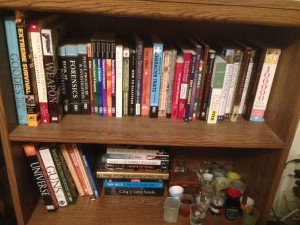A guest post by Peter J. Wacks
I’m taking a break from working on a Veronica Mars Media Tie In story to sit down and contemplate the following request: ‘If you could go back in time and speak with yourself as a new writer just starting out, what’s the most important piece of advice you would give yourself?’ The makes me think a lot of things.
First thing it makes me think, though, is that it’s a trick question.
I have accomplished a lot of what I have set out to do, and I have done it because of the failures I have embraced.
I manage Wordfire Press because I had the temerity to have a company fail in the game industry, over-hiring from a group of friends until it crashed itself under the weight of payroll. Without that failure… I never would have learned to abandon caution in your dreams—while laying groundwork—plans within plans—to protect your creative child in reality.
Without the frustrating failure of my first book The Divine Prank, which ended up in the trash as a 100,000 word partial manuscript under the first printing of Neil Gaiman’s American Gods, I wouldn’t have learned the hard edge of fight that lets me never back down, and always find a way through… that same edge that pushed me to sell tens of thousands of copies of my first book, Second Paradigm, by hand. It’s also what gave me the edge and strength to say no to a 2,000 book print run with a $2,500 advance from the big six and say, I’m not going to change the plot structure, I’m going to self-publish it instead.
There are a dozen other examples I won’t cite, because you get the point. What else does the question make me think of? What about successes? What about learning curve?
The second thing it makes me think is, what successes have I had that I could have amplified?
That is another slippery slope. The largest frustration I have dealt with when it comes to success is that I was a better writer in 2008 than I was in in 2012. I spent so much time on marketing and promotion that my writing style regressed.
I got worse.
Talk about frustrating! I couldn’t sling my stories as well! …Which forced me to study my style and start coauthoring with others to regain my skills and find new techniques.
It
Was
Awesome!
I am so much better now than I could have been by myself. Each author I have worked on a project with has amplified my skills. How could I give that up? Why would I give that up? More importantly—if I hadn’t been faced with my own lesser skillset, would I have been able to learn what I have, could I have embraced the growth? I don’t think so. Which ties back to failing your way forward, and we are back to our first answer.
The third, and final thing, that the question makes me think on is what I like to call the ‘Hallmark’ factor. What platitudes are out there that seem trite until you REALLY need to learn that lesson, at which point they become incredibly poignant? And how the heck do I generalize a very personal lesson to a large audience in such a way that they gain something of value out of it?
Don’t forget your personal relationships?
Sleep is important too?
Never give up, never surrender!?
And there it is, the one thing we can ALL learn from. But it is not something that any of us need from the past. If you are here reading, or in my case writing, then you haven’t given up. You haven’t surrendered. But…
Writer, musician, artist, actor… the title of a creative almost synonymous with the phrase self-doubt. So let’s not focus on a lesson for the past, but instead focus on a lesson for the present and, more importantly, for our future selves.
Every failure isn’t a failure. None of them are. They are just weapons your future self can use to create success. Be it a month, a year, a decade, or a lifetime of fighting, you are remarkable – because you haven’t given in! Because you fight, you learn, you grow, and each step that feels like it is a step back, is, in fact, something you will look back on in the future and say “Wow, I’m glad I learned that lesson then!”
Own your choices. Only you can. And every choice, good or bad, is what will, in the end, give you the strength to succeed… and you will, because you have been strong enough to not give up.
Write on.
~Peter J. Wacks
 Peter J. Wacks, the managing editor of Kevin J. Anderson’s WordFire Press, is a bestselling cross genre writer. He has worked across the creative fields in gaming, television, film, comics, blogging, and most recently he spends his time writing novels.
Peter J. Wacks, the managing editor of Kevin J. Anderson’s WordFire Press, is a bestselling cross genre writer. He has worked across the creative fields in gaming, television, film, comics, blogging, and most recently he spends his time writing novels.




